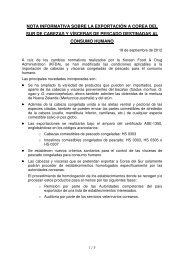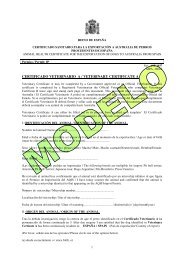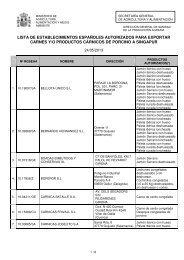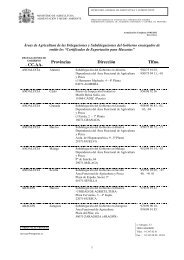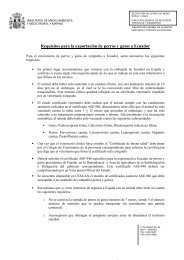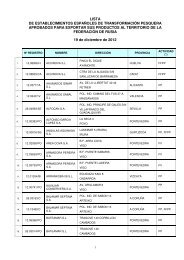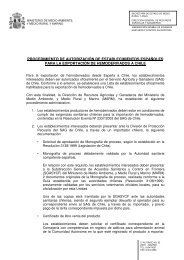- Page 1 and 2: Registered with the Ministry of Jus
- Page 3 and 4: No. 14, Article 1650, dated 1999),
- Page 5 and 6: (the paragraph was introduced by Am
- Page 7 and 8: 3.11. Pesticides shall be controlle
- Page 9 and 10: 3.36. Application of food additives
- Page 11 and 12: vitro using IgE, isolated from the
- Page 13 and 14: Group II - food products containing
- Page 15 and 16: Triacylglycerol lipase Aspergillus
- Page 17 and 18: Cellulase Penicillium funiculosum T
- Page 19 and 20: Pullulanase Klebsiella alrogenes Ba
- Page 21 and 22: Glucose isomerase Streptomyces liva
- Page 23 and 24: Glutaminase Bacillus subtilis B-D-g
- Page 25 and 26: Lactobacillus casei Strains, posses
- Page 27 and 28: Brevibacterium linens - Pediococcus
- Page 29 and 30: B. stearothermophilus - B. thermort
- Page 31 and 32: longibrachiatum Trichoderma reesei
- Page 33 and 34: Candida holmii - Candida krusei - C
- Page 35 and 36: а) examination of technological in
- Page 37 and 38: Table 4 Standards for Sampling of F
- Page 39 and 40: Powder-like Liquid Bacteria starter
- Page 41 and 42: Plasmid profile of GMM (GMA), isola
- Page 43 and 44: 5.10.11.2. Confirmation of generic
- Page 45 and 46: ConsultantPlus: note: The numbering
- Page 47: - when the food product contains vi
- Page 51: N FOOD ADDITIVES USED IN PRODUCTION
- Page 54 and 55: 35. Nitrogen (E 941) In accordance
- Page 56 and 57: 14. By-products of food and textile
- Page 58 and 59: No. Table 12 MEASURES FOR PESTS AND
- Page 60 and 61: 6.2. Pheromones - only in traps and
- Page 62 and 63: No. Table 14 PROCESSING AIDS, WHICH
- Page 64 and 65: VII. Sanitary-Epidemiological Requi
- Page 66 and 67: carrying agent, which increases the
- Page 68 and 69: Annex 1 to SanPin 2.3.2.1078-01, ap
- Page 70 and 71: without flame cleaning of the surfa
- Page 72 and 73: Index, Group of Indicators Permissi
- Page 74 and 75: which exceeds 5 days, cut and vacuu
- Page 76 and 77: Index, group of products Microbiolo
- Page 78 and 79: Index, Group of Indicators Permissi
- Page 80 and 81: Dioxins : according to Clause 1.1.1
- Page 82 and 83: Index, group of products 1.1.10. .
- Page 84 and 85: modified atmosphere 1.1.11.4. Cooke
- Page 86 and 87: ne Pesticides : 0.1 Hexachlorocyclo
- Page 88 and 89: Index, group of products Microbiolo
- Page 90 and 91: Index, Group of Products 1.1.17. Dr
- Page 92 and 93: Index, group of products 1.2. Milk
- Page 94 and 95: (as amended by Amendments and Addit
- Page 96 and 97: 1.2.2.4. Albumin mass from milk whe
- Page 98 and 99:
Index, group of Indicators Permissi
- Page 100 and 101:
Index, group of products Indicators
- Page 102 and 103:
Microbiological indicators: (as ame
- Page 104 and 105:
Index, group of products 1.2.11. Mi
- Page 106 and 107:
Index, group of products 1.3. Fish,
- Page 108 and 109:
Index, group of products 1.3.2. Can
- Page 110 and 111:
(as amended by Amendments and Addit
- Page 112 and 113:
Index, group of products Microbiolo
- Page 114 and 115:
aked, fried, boiled, in dressings,
- Page 116 and 117:
Index, group of QMAFAn Microbiologi
- Page 118 and 119:
crustaceans and other invertebrates
- Page 120 and 121:
addition of vegetable oils, dressin
- Page 122 and 123:
TOXIC EQUIVALENCY FACTORS (accordin
- Page 124 and 125:
of grain (insects, mites) Pest cont
- Page 126 and 127:
infestation by the causative agent
- Page 128:
Index, group of products Indicators
- Page 131 and 132:
Microbiological indicators: Index,
- Page 133 and 134:
East sweeties: - soft sweet type, k
- Page 135 and 136:
Index, group of products Indicators
- Page 137 and 138:
- creamy 5 х 1Е4 0.01 - whipped
- Page 139 and 140:
Index, group of products 1.5.6. Hon
- Page 141 and 142:
sweet pepper 200 400 Marrow squashe
- Page 143 and 144:
mixtures made of monocytogen es in
- Page 145 and 146:
- chips and extruded products with
- Page 147 and 148:
Index, group of products Indicators
- Page 149 and 150:
1.6.5.3. Concentrated tomato produc
- Page 151 and 152:
other fruit and berry concentrates
- Page 153 and 154:
Index, group of products 1.6.8. Spi
- Page 155 and 156:
1.6.9.4. Chopped coconuts 0.01 25 1
- Page 157 and 158:
Index, group of Indicators 1.7. Oil
- Page 159 and 160:
margarines 1.7.3.4. Vegetable oilba
- Page 161 and 162:
Index, group of products Indicators
- Page 163 and 164:
laevomycetin (chloramphenicol ) tet
- Page 165 and 166:
Index, group of Indicators Permissi
- Page 167 and 168:
Index, group of products Indicators
- Page 169 and 170:
Index, group of products 1.8. Bever
- Page 171 and 172:
Pseudomonas aeruginosa in 100 g are
- Page 173 and 174:
1.8.5.3. Concentrates (liquid, past
- Page 175 and 176:
1.8.6.4. Low-alcohol filtered paste
- Page 177 and 178:
Microbiological indicators: (as ame
- Page 179 and 180:
(as amended by Amendments and Addit
- Page 181 and 182:
Microbiological indicators: Index,
- Page 183 and 184:
Index, group of products 1.9.4.1. F
- Page 185 and 186:
Index, group of products Microbiolo
- Page 187 and 188:
Microbiological indicators: Index,
- Page 189 and 190:
Index, group of products Indicators
- Page 191 and 192:
Index, group of products Microbiolo
- Page 193 and 194:
Index, group of products Indicators
- Page 195 and 196:
1.9.14.6. Multicomponent dry soups,
- Page 197 and 198:
- with dressing (mayonnaise, sauces
- Page 199 and 200:
Boiled and fried fish with marinade
- Page 201 and 202:
- dumplings, 5 х 1Е2 1.0 - 1.0 -
- Page 203 and 204:
Ready-to-eat poultry and fish dishe
- Page 205 and 206:
Dibenzo-p-dioxin (PCDD) TOXIC EQUIV
- Page 207 and 208:
1.10.3. BAA based on predominantly
- Page 209 and 210:
Index, group of products 1.10.5.1.
- Page 211 and 212:
Index, group of Indicators Permissi
- Page 213 and 214:
Index, group of products Indicators
- Page 215 and 216:
QMAFAnM, 1 х 1Е4 CFU/g, not more
- Page 217 and 218:
- BAA — liquid based on pure micr
- Page 219 and 220:
-------------------------------- I
- Page 221 and 222:
Black currant (mash) 11.6 >= 750 26
- Page 223 and 224:
Alpha - tocopherol /polyunsaturated
- Page 225 and 226:
Linoleic acid mg/l 4000 - 8000 - Hy
- Page 227 and 228:
Linoleic acid mg/l 4000 - 8000 - Al
- Page 229 and 230:
- along with lactose maltodextrin a
- Page 231 and 232:
LIQUID FERMENTED MILK FORMULAS Coli
- Page 233 and 234:
Coliform bacteria (coliforms) 1.0 M
- Page 235 and 236:
2) Safety indices (in a ready-to-ea
- Page 237 and 238:
2) Safety indices Indicators Permis
- Page 239 and 240:
Pesticides : 0.55 hexachlorocyclohe
- Page 241 and 242:
(as amended by Amendments and Addit
- Page 243 and 244:
2) Safety indices Toxic elements: I
- Page 245 and 246:
3.1.2.2. Dry milk free instant porr
- Page 247 and 248:
3.1.2.3. Dry milk instant porridges
- Page 249 and 250:
Dioxins not allowed (introduced by
- Page 251 and 252:
monocytogenes Moulds, Yeast 100 50
- Page 253 and 254:
products from vegetable s and with
- Page 255 and 256:
2) Safety indices Toxic elements: I
- Page 257 and 258:
3.1.4. Meat-Based Complementary Fee
- Page 259 and 260:
3.1.4.2. Meat-Based Pasteurized Sau
- Page 261 and 262:
2) Safety indices Toxic elements: I
- Page 263 and 264:
3.1.5.1. Fish Canned Food Products
- Page 265 and 266:
3.1.5.2. Fish and Vegetable Canned
- Page 267 and 268:
1) Nutritional value (in 100 g of t
- Page 269 and 270:
Nitrosamines: sum of N-Nitrosodimet
- Page 271 and 272:
3.2.1.3. Meat Semi-Manufactured Pro
- Page 273 and 274:
3.2.2. Bakery, Flour Confectionery
- Page 275 and 276:
as amended by Amendments and Additi
- Page 277 and 278:
Dioxins not allowed fish semimanufa
- Page 279 and 280:
Pesticides : hexachlorocyclohexane
- Page 281 and 282:
2) Safety indices (in ready -to-eat
- Page 283 and 284:
Index, group of products Microbiolo
- Page 285 and 286:
2) Safety indices Indices Permissib
- Page 287 and 288:
Indices Toxic elements: 2) Safety I
- Page 289 and 290:
3.2.5. Canned Fruit and Vegetables
- Page 291 and 292:
-------------------------------- No
- Page 293 and 294:
2) Safety indices (in a ready-to-ea
- Page 296 and 297:
3.3.2. Products Based on the Soya P
- Page 298 and 299:
2) Safety indices (in a ready-to-ea
- Page 300 and 301:
Antibiotics : laevomycetin (chloram
- Page 302:
2) Safety indices Indices Permissib
- Page 305 and 306:
1) (as amended by Amendments and Ad
- Page 307 and 308:
3.3.5.1. Products without Phenylala
- Page 309 and 310:
(as amended by Amendments and Addit
- Page 311 and 312:
2) Safety indices (in a ready-to-ea
- Page 313 and 314:
acitracin 0.02 (as amended by Amend
- Page 315 and 316:
3.3.6.3. Freeze-Dried Products on V
- Page 317 and 318:
Fat g/l 34 - 45 + (as amended by Am
- Page 319 and 320:
Coliform bacteria (coliforms) 1.0 m
- Page 321 and 322:
if produced with the use thereof; m
- Page 323 and 324:
3.5.1. Milk and Soya Protein Isolat
- Page 325 and 326:
(introduced by Amendments and Addit
- Page 327 and 328:
3.5.2. Milk and Grain Based Porridg
- Page 329 and 330:
wheat, barley Т-2 toxin not allowe
- Page 331 and 332:
3.5.3. Fruit and Vegetables Based P
- Page 333 and 334:
Mycotoxins: Patuline Pesticides: he
- Page 335 and 336:
substances cream Dioxins: not allow
- Page 337 and 338:
3.6.1.9. Dry paracasein concentrate
- Page 339 and 340:
Index, products Indicators Permissi
- Page 341 and 342:
3.6.4.1. By-products of the livesto
- Page 343 and 344:
Index, products group QMAFAnM, Prod
- Page 345 and 346:
Index, products Indicators Permissi
- Page 347 and 348:
Pesticides: Hexachlorocyclohexane D
- Page 349 and 350:
Index, products Indicators Permissi
- Page 351 and 352:
Index, products group 3.6.10. Other
- Page 353 and 354:
2.3. natural metabolites: succinic
- Page 355 and 356:
17. Arisarum Arisarum L. All specie
- Page 357 and 358:
Sage, Spiny cocklebur) parts Fumito
- Page 359 and 360:
Cowwheat 156. Melampyrum sp. oil fr
- Page 361 and 362:
224. False sago palm Cycas circinal
- Page 363 and 364:
Jateorhiza palmata 296. (Columba) J
- Page 365 and 366:
330. Ferula gummosa Ferula gummosa
- Page 367 and 368:
- sporogenous aerobic and anaerobic
- Page 369 and 370:
14. Fried, jellied, salted, marinat
- Page 371:
Index Products Group Salt-water Fis
- Page 374:
Notes: 1) n/a - not allowed (Larva
- Page 377 and 378:
4.2. Tortoises 4.2.1. marine - - -
- Page 380:
E120 Carmines(CARMINES) colouring a
- Page 383:
E175 Gold (GOLD) colouring agent E1
- Page 387:
E261 Potassium acetates (POTASSIUM
- Page 391:
E329 Magnesium lactate, DL- (MAGNES
- Page 396:
E352 Calcium malates (CALCIUM MALAT
- Page 401:
E418 Gellan gum (GELLAN GUM) thicke
- Page 407:
E462 Ethyl cellulose (ETHYL CELLULO
- Page 413:
E495 Sorbitan monopalmitate, SPAN 4
- Page 418 and 419:
E538 Calcium ferrocyanide (CALCIUM
- Page 420:
E627 Disodium 5'-guanylate (DISODIU
- Page 424 and 425:
E944 Propane (PROPANE) propellant E
- Page 427:
E1403 Bleached starch (BLEACHED STA
- Page 430 and 431:
powder from leaves and syrup thereo
- Page 432 and 433:
No. Microorganisms Detected in Cann
- Page 434 and 435:
-------------------------------- F
- Page 436 and 437:
10.14 MU 4082-86 Methodological Ins
- Page 438 and 439:
10.87 MU No. 2142-80 Methodological
- Page 440 and 441:
27 GOST 10444.2-94 Food Products. M
- Page 442 and 443:
97 MUK 4.2.1122-02 Arrangement of C
- Page 444 and 445:
2. Glucocorticoids 2.1 Dexamethason
- Page 447:
cattle milk 0.025 5.6. Flumequine c
- Page 452 and 453:
6.8. Moxidectin 6.9. Doramectin 6
- Page 454 and 455:
Annex 13 (Reference) to SanPiN 2.3.
- Page 456 and 457:
Mineral substances, mg Iron 14 Iodi
- Page 458 and 459:
Dry and liquid, lenten and fermente
- Page 460 and 461:
16.18. Codex Alimentarius, v. 3, Ro
- Page 462 and 463:
Annex 18 to SanPiN 2.3.2.1078-01 FO
- Page 464:
Annex No. 3 to SanPiN 2.3.2.2804-10
- Page 467 and 468:
Annex No. 21 to SanPin 2.3.2.2804-1
- Page 469 and 470:
1.8 Streptomycin/ Dihydrostreptomyc
- Page 471 and 472:
1.16. All substances of sulfanilami
- Page 473:
1.24 Flumequine (quinolones) 1.25 C
- Page 476 and 477:
1.28. Difloxacin Cattle cattle and
- Page 478 and 479:
1.31 Erythromycin (macrolides) 1.32
- Page 480 and 481:
kidneys 3 14R) - 2-ethyl- 3,4,10,13
- Page 482 and 483:
1.40. Colistin (polymyxins) Bees ho
- Page 484 and 485:
Eggs 0.7
- Page 486 and 487:
1.53. Cloxacillin (penicillins) 1.5
- Page 488 and 489:
Other types of Eggs 0.1 livestock f
- Page 490 and 491:
2.11. Halofuginone All types of liv
- Page 492:
3.6. Cyfluthrin cattle, goats 3.7.



